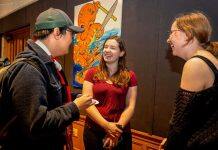

Lancaster University researchers need your help to study voice changes across the life cycle.
When we listen to a voice it is usually easy to tell if someone is younger or more advanced in years.
People are good at listening out for differences in pitch, croak, whisperyness, and wobbliness to make guesses about the age of a speaker.
Now Lancaster University researchers want to systematically study the differences in how we speak by comparing measurements of speech from young people and senior voices.
They will make recordings of approximately 200 speakers from the Lancaster and Morecambe district and then compare speech analysis to reaction times and measures of coordination.
The research will improve knowledge about changes to the voice across the lifespan and hopes are that it will contribute to healthcare in the longer-term.
Once researchers fully understand typical changes to the voice as we age, they might, they say, eventually be able to use vocal analysis in early diagnosis of conditions such as Dementia and Parkinson’s.
In addition, future researchers will then be able to better generate age- and dialect-appropriate voices for people who lose their ability to speak through conditions such as neuromuscular diseases or larynx cancer.
The Lancaster University research team think that any physical changes to the voice are also linked to regional dialect, as well as health and lifestyle factors.
For this reason, they say, it is important to study the voice in regions previously under-represented in research, like the North-West, and collect recordings from a large number of speakers.
The lead researcher, PhD student Seren Parkman, said: “We are really looking forward to working with the people of Lancaster and Morecambe to study vocal changes at different life stages. We want to make sure that voices from our region are properly represented in scientific research across the lifespan.”
The team are looking for people from Lancaster and Morecambe aged either 16-35 or 65+ who are willing to be recorded saying a series of words and completing some short paper-based puzzles about reaction times and coordination. This is suitable for all mobility abilities.
The team will travel to you to make the recordings, and participants will receive a £15 voucher for their time. Further information on how to book a recording slot is available on the project website.







































